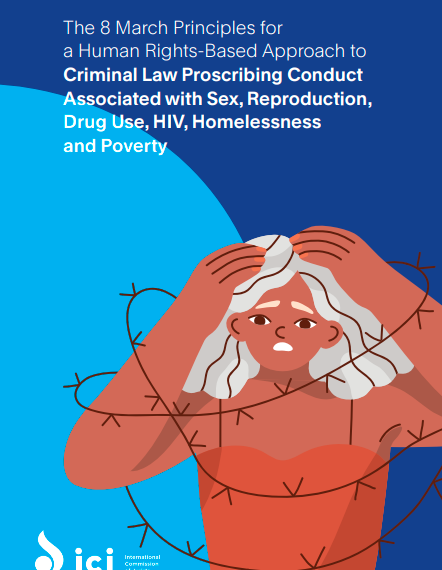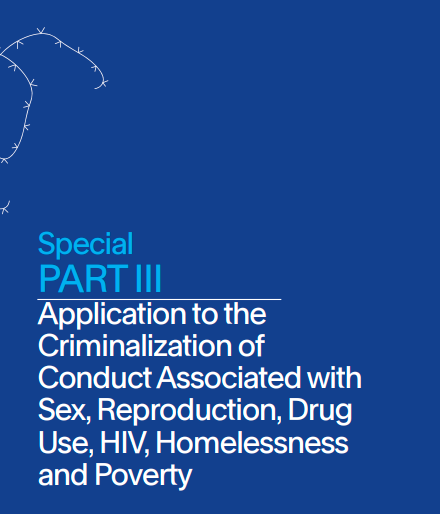
The Joint UN Programme on HIV/AIDS, UNAIDS, recently caused a stir. This policy paper came out: “The International Committee of Jurists (ICJ) along with UNAIDS and the Office of the High Commissioner for Human Rights (OHCHR) officially launched a new set of expert jurist legal principles to guide the application of international human rights law to criminal law.”
Sounds great, doesn’t it? Topics include:
- sexual and reproductive health and rights, including termination of pregnancy;
- consensual sexual activities, including in contexts such as sex outside marriage, same-sex sexual relations, adolescent sexual activity and sex work;
- gender identity and gender expression;
- HIV non-disclosure, exposure or transmission;
- drug use and the possession of drugs for personal use; and
- homelessness and poverty.
As with most things, the devil’s in the details.
To address the obvious: this is not legally binding on anyone. It’s just a paper. Still, that doesn’t mean the contents won’t work their way into Federal or Provincial legislation at some point.
As part of the Who We Are section, UNAIDS describes itself as “leading the global effort to end AIDS as a public health threat by 2030 as part of the Sustainable Development Goals.”

Apparently, UNAIDS timed this document to coincide with International Women’s Day. That’s interesting, to say the least.
Anyhow, this UNAIDS document is called the: “8 March Principles for a Human Rights-Based Approach to Criminal Law Proscribing Conduct Associated with Sex, Reproduction, Drug Use, HIV, Homelessness and Poverty”. (See archive).
In fairness, there could be a lot of poor and imprecise wording throughout the document. But assuming that there’s not, it’s quite disturbing what’s been put out.
Parts I and II cover more general areas and ideas in law, and often seem quite reasonable. Having laws applied equally and fairly to all is something most people can easily get behind. But Part III is where things change.

Part III (page 20) of the document is where things really get weird. The following comments are an accurate reflection of what’s actually being written.
(Principle 14, page 21) addresses “sexual and reproductive health and rights”. Apparently no one should be held accountable for a mother drinking or doing drugs while pregnant. Non-disclosure of HIV (or presumably any disease) isn’t to be considered illegal.
Moreover, where a person’s criminal actions might result in criminal consequences, there’s to be no extra punishments based on the existence of the pregnancy. An example of this would be the homicide of a pregnant woman leading to multiple murder charges.
Are the unborn babies expected to have any rights here?
(Page 22) there’s a provision where “parents, guardians, carers, or other persons” who enable or assist children in exercising their sexual and/or reproductive rights may not be held criminally liable. Is this sort of thing to justify pedophilia and grooming?
(Principle 15, page 22) suggests that there should be laws against abortion in any capacity whatsoever. This applies both to the mother, and any third party.
(Principle 16, page 22) covers “consensual” sexual activity. While this is premised on the idea that all participants are in agreement, the wording suggests that it could be applied to adults and children.
Consensual sexual conduct, irrespective of the type of sexual activity, the sex/gender, sexual orientation, gender identity or gender expression of the people involved or their marital status, may not be criminalized in any circumstances. Consensual same-sex, as well as consensual different-sex sexual relations, or consensual sexual relations with or between trans, non-binary and other gender-diverse people, or outside marriage – whether pre-marital or extramarital – may, therefore, never be criminalized.
With respect to the enforcement of criminal law, any prescribed minimum age of consent to sex must be applied in a non-discriminatory manner. Enforcement may not be linked to the sex/gender of participants or age of consent to marriage.
Moreover, sexual conduct involving persons below the domestically prescribed minimum age of consent to sex may be consensual in fact, if not in law. In this context, the enforcement of criminal law should reflect the rights and capacity of persons under 18 years of age to make decisions about engaging in consensual sexual conduct and their right to be heard in matters concerning them. Pursuant to their evolving capacities and progressive autonomy, persons under 18 years of age should participate in decisions affecting them, with due regard to their age, maturity
The prescribed minimum age of consent to sex must be applied in a non-discriminatory manner? What does that even mean? Is it discrimination if an adult is not allowed to be with a child?
The paper also states that minors should be participating in decisions that impact them, taking their age and maturity into account. Is this an attempt to turn a prohibited practice into more of a “grey area”?
As for “age of consent to marriage”, is that a reference to child brides?
There’s the issue of not criminalizing activity involving members of the alphabet soup. Just a thought, but since it’s okay to not disclose HIV status, would it also be okay to deceive a partner about their true identity?
(Principle 17, page 23) calls for the complete decriminalization of sex work — such as prostitution, or pornography — as long as it’s done without coercion or fraud. To their credit, it’s specified to be limited to adults.
(Principle 18, page 23) says that sexual orientation or gender identity should not be criminalized, but doesn’t define either term in a meaningful way.
Beyond that, there’s to be no penalty for “exploration, free development and/or affirmation of sexual orientation or gender identity”, unless coercion is involved. This leaves open the possibility of people just larping as the opposite sex, and who don’t have gender dysphoria.
It also doesn’t address the growing issue of using gender identity as a means to attack single-sex spaces, such as prisons, changerooms and most sports.
The document further criticizes any efforts or attempts to engage in conversion therapy.
(Principle 19, page 24) implies that it’s fine to not disclose HIV positive status to a partner, as long as there’s no deliberate attempt to spread it. Presumably, this wouldn’t just apply to HIV.
(Principle 20, page 24) effectively calls for the decriminalization of all drugs for personal use, including by minors and pregnant women. Part (b) could be interpreted to mean the possession or distribution or drug paraphernalia shouldn’t be criminalized either.
The document also promotes what could be considered safe injection sites.
(Principle 21, page 24) would end vagrancy and squatting laws, if done for life-sustaining reasons. While this is all understandable, it’s unclear what will happen with property owners. All said, this section is probably the most reasonable one, as it’s not an issue of immorality.
Now, just because the United Nations releases a document, that doesn’t mean it will become law. However, content from “non-binding” papers often do trickle into domestic politics.
(1) https://www.unaids.org/en/resources/presscentre/featurestories/2023/march/20230308_new-legal-principles-decriminalization
(2) https://www.unaids.org/en/whoweare/about
(3) https://icj2.wpenginepowered.com/wp-content/uploads/2023/03/8-MARCH-Principles-FINAL-printer-version-1-MARCH-2023.pdf
(4) UNAIDS March Principles On Criminal Law Sexual Behaviours
